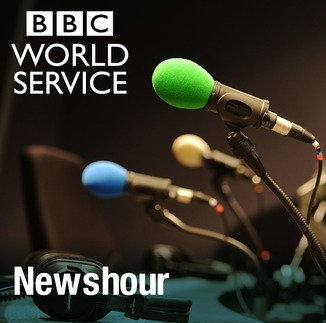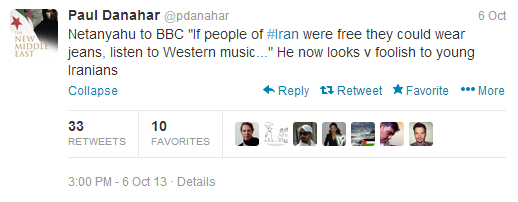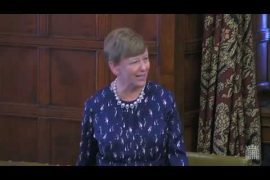In part one of this post we looked at the first part of a long interview (from 30:05 here) with the PLO’s Saeb Erekat which was aired on June 20th (ahead of the upcoming economic workshop in Bahrain) on the BBC World Service radio programme ‘Newshour’ presented by Razia Iqbal.
[emphasis in italics in the original, emphasis in bold added]
From 34:09 Iqbal continued:
Iqbal: “Do you think that the conference in Bahrain next week marks the beginning of the end of any notion of the two-state solution?”
Erekat: “I don’t think the notion of the two-state solution will ever disappear because it’s the only solution. If not this year, in 50 years. The difference will be how many Israelis and Palestinians will be killed because of these short-sighted, political blind politicians who believe that they’re here to carry out the settlement programme.”
With Erekat having used such terminology in the past, Iqbal should obviously have been ready to challenge that latter statement but refrained from doing so.
Iqbal: “But you say that the two-state solution will never disappear but there is also the idea of one state and equal rights for citizens, isn’t there?”
Erekat: “This will never be accepted by Israelis. Today from my home town Jericho on the Jordan River to the Mediterranean I am – a Christian and Muslim Palestinian – I’m 50.9% of the population. Benjamin Netanyahu’s 49.1% of the population.”
Iqbal: “The demographics go against it.”
BBC World Service radio listeners than heard Erekat promote the ‘apartheid’ smear – which went totally unchallenged just as was the case in his earlier interview on Radio 4.
Erekat: “So, Netanyahu and Kushner are trying to dictate what I call one state, two systems: apartheid. There are roads in the West Bank I cannot use today. I have a green ID card. Netanyahu has a blue ID card. I drive a car with white and green licence plate. Netanyahu drives a car yellow licence plate. There is a deeper apartheid system in the West Bank and East Jerusalem today than the one that existed in the darkest hours of South Africa’s apartheid. That’s the truth.”
Listeners were not told that while there is a grand total of 40.22 kms of roadway that Palestinian plated vehicles cannot use for security reasons, there are also roads – for example in Erekat’s home town of Jericho – that Israeli vehicles cannot access. Neither was it clarified that Erekat’s licence plates are a different colour to those of Israeli vehicles because he lives in Area A under total Palestinian Authority control and his vehicle registration comes from that authority, not from Israel. Likewise, Erekat is not an Israeli citizen and hence does not have the blue ID card given to all Israeli citizens regardless of religion or ethnicity.
In other words, Razia Iqbal and the ‘Newshour’ team were quite happy for listeners to go away with materially misleading impressions created by Saeb Erekat’s lies about an ‘apartheid’ system which does not exist.
Erekat: “So if one state, two system apartheid is not gonna work and we’re not gonna make work and if what many of Palestinians now are saying one state equal rights which is [unintelligible] as concept for Jews, Muslims and Christians to live equal, it’s not doable for Israelis. Palestinian and Israeli relations is like physics; there is no vacuum. If they kill the two-state solution that will translate into blood of Palestinians and Israelis.”
Iqbal then went on to ask whether the participation of Arab states in the Bahrain workshop is a “betrayal”, to which Erekat replied in the negative, going on to claim that all participants “will say the only solution is a two-state solution, State of Palestine, with East Jerusalem as its capital on the 1967 borders”. Failing to point out to listeners that there is no such thing as “1967 borders”, Iqbal went on:
Iqbal: “But given the economic…the dire economic straits that the Palestinian Authority is in, isn’t it true that there is a vested interest for Egypt and Jordan – these two states in particular – to see a real change inside the Palestinian Authority and that there is animus against Mahmoud Abbas and that their presence at the conference could result in them being on the side of the Americans and saying actually this man is not the person that will help the Palestinians in the long term?”
Erekat: “This man was elected by the Palestinian people and he’s the president of Palestinian people and our law says he’ll be in office till a new president’s elected.”
With Iqbal having brought up the topic of Abbas herself, one would have thought that she would have been able to tell her listeners that his term of office ended over a decade ago and that presidential elections have not been held since 2005.
Iqbal: “Which will be when? When’s the date of the next election?”
Erekat: “We are trying now to get Hamas to accept elections. But I will tell you something: if Mother Theresa were to be the president of Palestinians and Montesquieu to be the speaker of Palestinians and Thomas Jefferson were to be the prime minister of Palestinians and they would say together a Palestinian state on the 1967 lines with East Jerusalem as its capital, they’d be branded as terrorists, corrupt, not good to govern.”
Failing to challenge that egregious assertion that Palestinian leaders have been “branded as terrorists” merely because they demand a Palestinian state, Iqbal went on to nurture Erekat’s politically motivated victimhood.
Iqbal: “And you say this because you think that there is a deep-seated…you’re suggesting that there’s a deep-seated antipathy to Palestinians per se?”
Erekat: “There is a deep ideological, religious commitment by people like Friedman, Kushner and Jason Greenblatt. These are settlers. These are belong to the school of settlers. Friedman used to be a guard in the Beit El settlement. Jason Greenblatt’s kids are studying in Gush HaTzion [sic – Gush Etzion] Israeli settlement. Their commitment is ideological. They don’t believe of us as people.”
Once again Iqbal should have been ready to challenge those claims because Erekat has used them before. She however had nothing to say about Erekat’s portrayal of US officials as “settlers” and instead presented her last question:
Iqbal: “Do you regret being part of the Oslo agreement though in the context of the burgeoning settlements which really came out of Oslo?”
The number of Israeli communities in Judea and Samaria of course cannot be accurately described as having ‘burgeoned’ since the Oslo Accords were signed and Iqbal made no effort to clarify that those agreements – signed by Erekat and his colleagues – placed no limits on construction in such communities.
Erekat: “No I don’t regret for a minute trying to achieve peace because I’m not doing anybody a favour. No-one benefits more from achieving peace more than the Palestinians and no-one stands to lose more in the absence of peace than Palestinians. And I really couldn’t care less if someone is pro-Israel or someone’s pro-Palestine. My world is divided between those who are pro-peace and those who are against peace.”
Razia Iqbal could have used the opportunity presented by and eight and a half minute interview with Saeb Erekat to delve into the issue of why he and his colleagues have repeatedly thwarted peace-making efforts over the past two and a half decades and to examine the question of whether it is time for “one of the most senior and long serving Palestinian officials”, as Erekat was presented in the programme’s synopsis, to step aside after having made no progress in his ostensible mission for a quarter of a century.
But rather than raise that and no less relevant issues such as Palestinian terrorism, the Hamas-Fatah split and the Hamas ideology which completely rejects the two-state solution, Iqbal was content to provide Erekat with a platform from which to present his talking points concerning the Bahrain conference largely unchallenged.
The BBC cannot seriously claim that this interview and the earlier one on BBC Radio 4 made a meaningful contribution to audience understanding of the topic.
Related Articles:
More PLO propaganda and polemic on BBC WS radio – part one
BBC journalists get a ‘briefing’ from a past interviewee
BBC Radio 4 provides a platform for the PLO’s ‘apartheid’ smear




